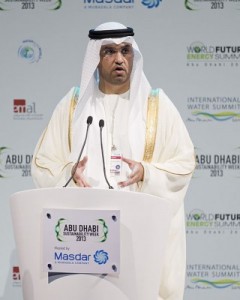
UAE Takes Lead Role in the Gulf on Climate Action
Sultan Ahmed Al Jaber of Abu Dhabi writes an important op-ed in Gulf News about the importance of finding solutions to climate change, titled “The Climate Change Challenge.” He says that Abu Dhabi will “bring the world together to drive more solutions” to this issue at a meeting in May called Abu Dhabi Ascent to drive momentum towards finding solutions to climate change.
Sultan Al Jaber wears several hats in the UAE; he is Minister of State, the Chairman of Masdar, the Chairman of the Abu Dhabi Ports Company, and the UAE’s Special Envoy for Energy and Climate Change.
In his op-ed, Al Jaber says that in “driving investment in new technologies, innovation and educational opportunities for all” it is necessary for all nations to “work together on big win-win opportunities that will reduce emissions” and combat climate change. He then writes of the “positive solutions to reduce emissions while creating economic and social opportunities” –“where the UAE excels.”
The UAE would not be an observer’s first pick for a leader on sustain able energy and climate change. As a member of OPEC with the 7th largest proven oil reserves in the world, it would be understandable for them to fight against sustainable energy, or to act as a “spoiler” for global negotiations on climate change. After all, any real efforts to combat climate change will leave at least a portion of their vast oil and natural gas reserves unused. However, they realize that fossil fuel reserves are limited, by their very nature and over the last decade, the UAE has become a leader in developing renewable power.
able energy and climate change. As a member of OPEC with the 7th largest proven oil reserves in the world, it would be understandable for them to fight against sustainable energy, or to act as a “spoiler” for global negotiations on climate change. After all, any real efforts to combat climate change will leave at least a portion of their vast oil and natural gas reserves unused. However, they realize that fossil fuel reserves are limited, by their very nature and over the last decade, the UAE has become a leader in developing renewable power.
UAE’s principal contribution to sustainable energy is the state run renewable energy company Masdar, of which Dr. Jaber is the Chairman of. Accroding to Al Jaber, Masdar “is building the world’s most sustainable city to discover how design, infrastructure and technology accommodate for denser populations, while dramatically reducing energy, water and waste usage.” Masdar supports nearly 1 gigawatt of clean energy capacity from wind and solar power around the world.
In addition, after signing a Section 123 Agreement with the US in December, 2009 the UA has begun to install a series of four nuclear power plants that will meet 25% of UAE’s electricity demand with carbon-free power by 2020.
The attention that the UAE can bring to climate change and clean energy within the Persian Gulf region is extremely important because, (as ASP’s Climate Security Report found) the Middle East “faces severe water scarcity issues, which has led to droughts and food price spikes.” Climate change will inevitably make the many security challenges that the Middle East faces worse and more difficult to address. Security planners say that climate change will multiply existing threats.
Unfortunately, in ASP’s The Global Security Defense Index on Climate Change, we found that “The plurality of states in the region… have no defined position” on climate change as a security threat, despite “the many pressing challenges faced by every country of the region.”
Similar to its leadership on energy and sustainable development, the UAE is a leader on examining the security consequences of climate change. In a white paper on Food Security and Water, the UAE’s government said:
“Climate change and an estimated global population increase to nine billion people by 2050 together raise considerable uncertainty about the planet’s ability to continue to feed its inhabitants…the humanitarian crisis in the Horn of Africa, have highlighted the importance of food security.”
Considering the security costs and threats climate change exerts over the region, it is important to see Sultan Ahmed Al Jaber’s leadership on climate change. The UAE should be a model for other energy producing countries in the region; it is preparing for the threats of climate change, and it is investing heavily in developing solutions.





